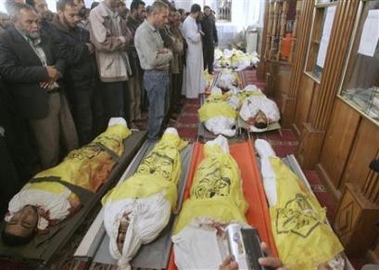Tears and anger as Gaza buries its dead
(Reuters)Updated: 2006-11-09 22:46
BEIT HANOUN, Gaza - Tens of thousands of Palestinians gathered at a mass funeral in Gaza on Thursday as the bodies of 18 civilians killed by Israeli shelling were buried to the accompaniment of gunfire and vows of revenge.
 Mourners pray near bodies of the 18 Palestinians killed by Israeli artillery shell during their funeral at Beit Hanoun town in the northern Gaza Strip November 9, 2006. [Reuters]  |
Groups of militants, some masked and firing their weapons in the air, flanked a procession as it snaked through the streets of Beit Hanoun, where Wednesday's attack took place, before the dead were laid to rest in a new cemetery.
The bodies, including seven children and four women, were each wrapped in a yellow flag, the symbol of the Fatah movement of Palestinian President Mahmoud Abbas, and born aloft on stretchers among a vast crowd of tearful and angry mourners.
Cries of "Allahu Akbar" (God is greatest) filled the air as the bodies were placed in their graves. The youngest was an 18-month-old girl laid in the ground by her weeping father.
After the burials, a Fatah official pledged vengeance on Israel in a loudspeaker address to the crowds.
"Killers in Israel, you will never be able to defeat one Palestinian child," said Abdul Hakim Awad.
"We say, an eye for an eye and a soul for a soul. There will be no security in Ashkelon, no security in Tel Aviv or Haifa, until our people in Beit Hanoun are made secure."
Palestinian leaders have called Wednesday's attack a massacre, and some Hamas lawmakers in Gaza have threatened to resume suicide attacks against Israel as a result.
Israeli leaders have expressed remorse for the incident, which they said was probably the result of rounds overshooting their target. The army said it was targeting rocket launchers.
"Wednesday was a day of tragedy beyond imagination and Thursday is a sad day, a black day," said Abu Mohammed, a spokesman for the Aqsa Martyrs' Brigades, an armed faction allied to Fatah.
"(It is) a stigma on the head of the enemy and the occupation," he said, adding it would inspire militants to fight Israel, which quit Gaza last year after 38 years of occupation.
UNITY GOVERNMENT TALKS
The Beit Hanoun killings rallied Palestinians after months of factional infighting between Fatah and Hamas, an Islamist group dedicated to Israel's destruction.
Israel's defense minister ordered a halt to artillery fire in Gaza and for an investigation to be completed by Thursday.
But Damascus-based Khaled Meshaal, leader of Hamas, which runs the Palestinian government, urged retaliation.
Hamas declared a partial truce in March 2005 that expired at the year-end. It has not carried out suicide bombings in Israel since 2004, although some leaders said they could be resumed.
Hamas's armed wing, decrying Washington's support for Israel, appeared to call on Muslims to attack U.S. targets, urging them "to teach the American enemy harsh lessons," calls that have not been heard in the past.
While the European Union said it was "appalled" by the Gaza shelling, an initial response by the United States stopped short of reprimanding Israel, whose Prime Minister Ehud Olmert is due to meet President George W. Bush in Washington on Monday.
The Beit Hanoun killings brought together the moderate Abbas and Palestinian Prime Minister Ismail Haniyeh of Hamas, who have been at odds over a proposal to create a unity government that might help lift a Western aid blockade.
Abbas and Meshaal later spoke by telephone, in a further sign of greater cooperation between the rival movements, suggesting progress could soon be made on a unity government.
Haniyeh suspended coalition talks after the Beit Hanoun shelling but said he expected them to resume within days. A senior Abbas aide said a unity government could be imminent.
|
||
|
||
|
|